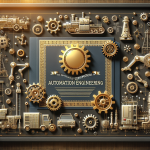In today’s fast-paced technological landscape, the role of an Automation Engineer is increasingly critical. As businesses seek to enhance efficiency, reduce errors, and save time, these professionals are at the forefront of developing automated solutions that streamline processes. This article delves into the key responsibilities and expectations of Automation Engineers, providing insights for aspiring professionals and those looking to understand this pivotal role better.
Who is an Automation Engineer?
An Automation Engineer designs, develops, and implements automation systems to improve efficiency and reliability in processes, typically within software development, manufacturing, and IT operations. Their primary aim is to replace manual tasks with automated solutions, thereby minimizing human error and increasing productivity.
Key Responsibilities
1. System Design and Development
Automation Engineers are responsible for designing automation solutions tailored to specific business needs. This involves:
- Analyzing existing processes to identify areas ripe for automation.
- Developing system architectures and deciding on the most effective tools and technologies for automation.
2. Testing and Quality Assurance
Ensuring the functionality and reliability of automated systems is paramount. Engineers conduct thorough testing, which includes:
- Creating and executing test scripts.
- Debugging and troubleshooting issues to maintain the quality of the automated systems.
3. Integration
Automation Engineers often need to integrate automated solutions with existing systems. This can involve:
- Collaborating with software developers to ensure seamless communication between systems.
- Working with various APIs and databases to establish connections and data flow.
4. Maintenance and Support
After deployment, engineers are tasked with maintaining automation systems:
- Monitoring performance and resolving any issues that arise.
- Updating systems as necessary to adapt to changing business needs or technological advancements.
5. Documentation
Thorough documentation is crucial for the ongoing success of automation initiatives. Responsibilities include:
- Creating comprehensive manuals and process documentation.
- Maintaining up-to-date records to support future troubleshooting and system upgrades.
6. Collaboration
Automation Engineers frequently work in interdisciplinary teams, making collaboration essential. They engage with:
- Software developers and IT specialists to align automation efforts with organizational goals.
- Project managers to ensure that automation projects meet deadlines and requirements.
7. Continuous Improvement
Keeping abreast of the latest trends and technologies in automation allows engineers to:
- Propose enhancements and new solutions that could benefit the organization.
- Participate in training programs to continuously upgrade their skills.
Skills and Expectations
1. Technical Proficiency
A strong foundation in programming languages (e.g., Python, Java, C#) and tools (e.g., Selenium, Jenkins, Ansible) is essential. Familiarity with database management and cloud technologies can also be beneficial.
2. Analytical Skills
Automation Engineers must excel at problem-solving and analyzing complex systems to identify flaws and inefficiencies that can be automated.
3. Attention to Detail
Given the complexity of automation tasks, a meticulous approach is necessary to ensure systems function correctly and meet all specifications.
4. Communication Skills
Since Automation Engineers frequently collaborate across different teams, effective verbal and written communication skills are vital for articulating ideas and project details clearly.
5. Project Management
Understanding project management principles can help engineers oversee their automation initiatives better, ensuring they align with strategic business objectives.
Conclusion
The role of an Automation Engineer is multifaceted, requiring a unique blend of technical skills, analytical capabilities, and effective communication. As businesses continue to leverage automation to drive efficiency and innovation, the demand for skilled Automation Engineers is only expected to grow. For those looking to enter this dynamic field, understanding key responsibilities and expectations is essential for building a successful career in automation engineering. Whether you’re a recent graduate or a seasoned professional seeking a new challenge, the opportunities in automation are boundless and promising.




